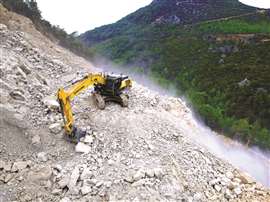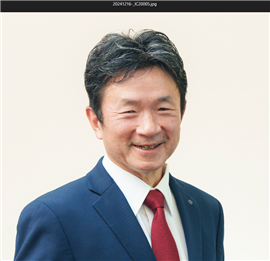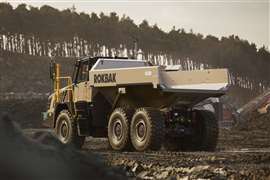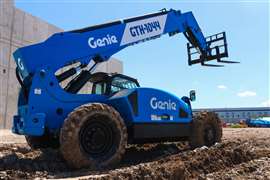Read this article in Français Deutsch Italiano Português Español
Tradition, technology and tariffs: Inside Sumitomo’s long game
08 July 2025
It is to be expected that, when speaking to those in charge of billion-dollar companies, sometimes a question is asked but not really answered. However, Mr Isamu Mitsuhashi, President and CEO of Sumitomo Construction Machinery, was refreshingly forthright and open when speaking with Construction Briefing at Bauma Munich in Germany.
 Sumitomo produces excavators and asphalt pavers. Image: Sumitomo
Sumitomo produces excavators and asphalt pavers. Image: Sumitomo
Topics included the company’s evolving global strategy, its approach to automation and electrification, current market conditions and why striking the right balance between innovation and reliability remains central to its identity.
Sumitomo is a Japanese company that produces excavators and asphalt pavers. Stereotypically speaking, Japanese companies are among the most stable but conservative in the world, but Isamu says that, even in this context, “Sumitomo is a very conservative and traditional company, even in Japan... We always want things to be 100% finished before talking about them.”
Such an approach has positives and negatives: it can mean that sometimes the industry is not aware of everything that the OEM is doing and the progress it is making on different types of technology. However, the positive it that when they say that a product or technology is ready the market has great confidence that this is indeed the case.
Mitsuhashi concedes that, “It’s a balance to try to strike… but we need to change something otherwise we cannot fight with other competitors, especially the Chinese manufacturers.”
One of the things that Isamu wants the company to shout more about is its progress with technology, such as electric power and automation.
Technology: moving carefully, but purposefully
Sumitomo is actively developing autonomous systems, working with its parent company (Sumitomo Heavy Industries) on research and development (R&D) for automated features. “Everything is still under R&D. But we’re working on this. Within a few years, we try partially autonomous.”
Excavators present particular challenges for automation. “The movement action is really complicated… digging and swinging and travelling, everything,” he explained. In contrast, “grading and dumping [are] much more suitable for autonomous.”
 Mr Isamu Mitsuhashi, CEO of Sumitomo. Image: Sumitomo
Mr Isamu Mitsuhashi, CEO of Sumitomo. Image: Sumitomo
Sumitomo is focusing on more achievable areas first, such as with its asphalt paver, with the company having a goal for this to be able to operate increasingly autonomously.
“Within a few years we try to run it autonomously. But it is fluid, we are not sure how long it will take – five years, ten years, I’m not sure.”
The CEO also makes an interesting point: just because the technology might be available in the future, it does not necessarily follow that all customers will want to take up.
“Another issue is the balance of price and the benefit from the customer, it’s really important. So of course, to launch this to the market, it would be a very big hardware for us. The technology is very efficient but it needs to have a balance between benefits and cost for the customer.”
Construction’s electrification challenge
This issue of cost comes up again as the conversation turns to electric equipment. Sumitomo has already exhibited 8-tonne and 13-tonne electric excavators at international and domestic shows, including ConExpo in Las Vegas, US, but is not yet in mass production for these types of machines.
Mitsuhashi reveals that there is strong interest from major Japanese contractors, especially those that have a focus on sustainability. One of these is a, “Big construction company that does a lot of work with water and the environment… Safety and the environment, that’s a key point.”
However, due to the high cost in buying such equipment he says it may be, “very difficult for small construction companies” to afford the equipment and there is also the issue of charging infrastructure, and the current working time that equipment has on one charge.
He stressed that, as it stands, electric machines are only viable for select users. “Maybe we, as construction, need to make longer the working time by one charge and to slow the charging time.”
Still, the company is currently working on a 20-tonne electric excavator and the demand for such equipment may increase in Japan due to regulations as Mitsuhashi reveals that the Japanese government, “Are trying to make some subsidies for the electric machine, this is something they recently decided.”
Navigating a tougher market
 The Japanese construction market is traditionally a stable one. Image: Adobe Stock
The Japanese construction market is traditionally a stable one. Image: Adobe Stock
Following a strong 2023, Sumitomo’s momentum has slowed slightly. “The first half of 2024 is not so bad and 2023 is a very good year, maybe for every construction machinery company,” Mitsuhashi said. “But suddenly the last half in 2024 dropped down… It’s a problem that is continuing in 2025. It’s not so good as last year.”
He highlights that Europe has been a real challenge, saying, “Europe is a real low. Sales are worse than several years ago,” he said, adding that France and Germany have seen particularly subdued activity.
In Japan he describes the situation for construction as “stable” with solid demand from the private and public sector. He adds that, “In Japan a lot of our infrastructure is very old and needs maintenance, there is a demand for some maintenance construction.”
Despite the short-term headwinds, Sumitomo remains a globally minded company, with around 60 to 70% of sales now outside Japan. That international reach, however, brings its own complexities, such as supply chains and tariffs.
Supply chain resilience remains a focus, particularly with changing tariffs and geopolitical friction. “We are searching [in] some other countries in Asia for fabrication parts,” Mitsuhashi explained.
He added that they are working hard to keep their manufacturing plant open in China but that – especially with the tariffs – this is an increasingly large challenge.
Another issue that impacts construction globally is a lack of workers. “A serious issue is factory worker shortage,” Mitsuhashi said. “We can hire [only] half as many as we would like... it may be trouble for the Japanese plant.”
Despite these challenges, the future is bright. In the next three years, Sumitomo aims to accelerate its development of autonomous systems, AI, and software-driven features. “We try to [move into] mass production... We try more future technologies.”
While Mitsuhashi is clear-eyed about the challenges ahead – from tariffs to electrification to labour shortages – Sumitomo’s strategy is not one of disruption, but of deliberate evolution. The focus now is on bringing innovation to market with confidence, expanding its global footprint, and making sure the industry knows exactly what the company is capable of.
STAY CONNECTED


Receive the information you need when you need it through our world-leading magazines, newsletters and daily briefings.
CONNECT WITH THE TEAM










